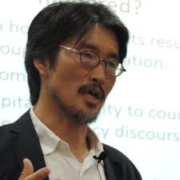Bob Adamson
PISA, policy referencing, and pantomime
Today we continue our mini-series on global learning metrics during the lead up to the inaugural CIES Symposium, which will take place in Scottsdale, AZ this November.
So far in this mini-series, we’ve heard why international assessments can be valuable for national governments and how many governments have begun to see like PISA. Today, we jump into a case study of the way in which countries learn from one another based on international assessments.
My guest, Professor Bob Adamson, takes us through the case of how England learned from Hong Kong. He unpacks the selective learning of English policymakers on their visits to Hong Kong. He see this as akin to political pantomime. The larger implication of the rise of superficial policy referencing among countries is the challenge it brings to comparative education.
Bob Adamson is Chair Professor of Curriculum Reform and Director of the Centre for Lifelong Learning Research and Development at the Education University of Hong Kong. In December 2015, Bob was named UNESCO Chair holder in Technical and Vocational Education and Lifelong Learning.
Citation: Adamson, Bob, interview with Will Brehm, FreshEd, 45, podcast audio, October 10, 2016. https://freshedpodcast.com/bobadamson/
Will Brehm 0:42
Bob Adamson, welcome to FreshEd.
Bob Adamson 2:05
Thank you Will.
Will Brehm 2:06
So, Hong Kong and England may seem like totally different places, especially for people who have been to both locations, but international assessments have brought them together in a very strange way. And you’ve been looking at this for some time now. So, how has England, the former colonial power, viewed Hong Kong’s international assessment scores, say in the early 2000’s?
Bob Adamson 2:34
Well, let me begin by the very first point about the differences between the two. I mean, as you mentioned, Hong Kong was a colony of Britain. And it did import a lot of the features of the British education system. So, that’s a point of similarity. But in terms of how Hong Kong was viewed by Britain, I don’t think it was on the radar screen at all until the power of these international student assessments became so important. The great attention that’s paid to league tables in education really became the fad later in the 2000’s. And also with the British government, being elected on a mandate to really address education issues. And so, when the British government -and I should really clarify that I’m talking about education policy for England, given the devolved nature of education within the UK- the government was concerned about England’s performance in the rankings. And so, it looked to those places that were performing extremely well. And East Asia with Singapore, Hong Kong, and more recently, Shanghai, and South Korea were the high performers. So, they decided, “Well, what are they doing so well, that we can learn from”? And that was why Hong Kong became a target of interest and emulation.
Will Brehm 4:13
So, it’s interesting because as you said, Hong Kong imported a lot of ideas in education from the colonial power, England. And England, more or less, didn’t look too closely at Hong Kong’s education system until there was these international assessments. And then things changed.
Bob Adamson 4:36
Yes. And it was really part of the colonial mentality that Hong Kong was seen as dependent on Britain. And I should say, it wasn’t kind of direct exportation. There were some general frameworks, general ideas but Hong Kong did have considerable autonomy in adapting British models. So, I would see the education as being British style education but with distinctive Hong Kong characteristics. So, it wasn’t a very close relationship in those kinds of terms. But Britain really, in the 2000’s, underwent a bit of a crisis in education. It was part of the time when education became very strongly linked with economic productivity. And so, it was viewed that with the things like the Asian economic crisis impacting strongly, and then the banking problems in 2008, and the economic problems that Britain found itself facing, education was seen as a way of pulling the economy together and getting a new focus. And that’s how they started looking around and using comparative education as a strategy in policymaking.
Will Brehm 6:05
So, these domestic factors in the early 2000’s, obviously created the impetus for the UK or England to look abroad, like you said, in comparative ways to learn from others. But what about as future PISA results or international assessment results came out and Hong Kong continued to do well -and I’m thinking most recently in 2012 when Hong Kong scored virtually in the top, if not at the top, across reading and math and science- has England and the policymakers in England looked at Hong Kong differently?
Bob Adamson 6:49
I think it’s more complex than that. In terms of the politics, in England specifically, there was an ideological battle going on. The party in power -in fact, two parties in power, it was a coalition government- were fairly traditional, conservative politicians, and particularly those in charge of education policy. They were looking at things like back to basics, we got to do more grammar in language, we’ve got to do mathematics, we’ve got to get away from skills-based and competence-based education or the newfangled ideas. These that were seen as kind of left-wing or even Marxist approaches to education and producing a kind of society that they didn’t want. And they took on the educational establishment, they took on the leading education research universities, and it became oppositional. It became really almost an ideological warfare. And so, to find some ammunition, to support the directions that the education policy in England would take, they looked for countries which they could associate with these kinds of traditional approaches. Now, that’s why they rejected Finland. They went to have a look at Finland, which is a leading European example. But they decided it was much too socialist for their taste. Too much about equity and about individualism. So, East Asia was more attractive because of this kind of traditional mindset that would support the more conservative policymakers in their attempts to reform education by fighting against the fairly progressivist agenda that many of the educators in England were pushing for.
Will Brehm 8:52
So, what makes up this, quote, unquote, idea of traditional education? In my mind is that it still seems rather colonial even to suggest that.
Bob Adamson 9:03
I think it’s colonial in the sense that it is generational passing on of the great literature of the past, of seeing academics as disciplines rather than skills based, that we look, for example, at the tradition of the public schools in England where many of the policymakers actually were educated themselves. Looking at issues of discipline, the teachers in control of the classroom, students paying attention, students listening. A kind of reduction in the importance of the student voice and individualism in education. And also, the political issues that if you use league tables as your goal, politically as your measure a political success, as say, a minister of education might do is also what you’re going to be bashed over the head with if your country’s ranking slips. So, how do you get your ranking score higher? Well, it’s by performing better in assessment. Therefore, you need examination skills, you need more rote learning and memorization. So, all those kinds of factors brought about this whole movement that emphasized teacher-centeredness, content, looking at the history, looking at the traditions of education, rather than what was seen as more progressivist view of a looser curriculum frame, cross curricular skills, individualism, student voice.
Will Brehm 10:52
It’s interesting that there is this whole discourse around student centered learning. And yet, you’re saying that policymakers in the UK were emphasizing the need to have teacher-centered learning?
Bob Adamson 11:10
Yes. There was a feeling that schools were failing academically. And academically was judged by results, examination results and performance in these international student assessments. So, in order to be seen to have a world class education system, as measured by a high ranking, then we needed to go back to basics, we needed to put the teacher back in control, we needed to have a body of knowledge that students would need to master and then reproduce in an examination and “Hey, presto! England would rise up the table”. And also, as a byproduct, the economy would recover, we’d have a better workforce being produced, and all these other benefits as well.
Will Brehm 12:08
Oftentimes, we hear about the East Asian countries that do so well on these international assessments, as following a quote unquote, Confucian model of education. Did the UK policymakers that were thinking Hong Kong was such a great place to emulate, were they using similar ideas in their understanding?
Bob Adamson 12:37
I think they admired the characteristics that have become associated with Confucianism. Personally, I don’t like the term Confucian heritage because actually, if you look at Confucius, he was a progressivist. He believed in individualism and differentiated learning and so on. But over time, there are certain aspects of education and values surrounding education which tie in with the ideological positioning that the policymakers in the UK wanted to replicate. And so, what we have is the notion that education is important in East Asian societies. And my own view is I think it’s because of, in Hong Kong’s case where it is mainly a refugee society, it has an aristocracy but not as deeply entrenched as in Britain, for example. And that education was the means to success, to social mobility. So, parents would come in particularly when you don’t have a social welfare network, when there wasn’t any provision for pension. And therefore, you would rely on your children’s future earnings for your own pension. Therefore, education was so important in order to get a good job, climb up the ladder, make a lot of money, and therefore take care of family responsibility. So, education was seen as key. Traditionally, also, in Chinese culture, examinations were seen as the essential way of getting into the civil service in the Imperial times. And so, exams were seen as really the benchmark that -you know, all this business of continuous assessment or informal assessment, that’s all just peripheral. What really counts is how well you perform under exam conditions. So, that again, had an influencing impact. And then you have the role of teacher, teacher as being a whole life mentor. That it goes beyond just the classroom, that you’re a teacher for life, and being a teacher has got quite an elevated status in society -much higher than it has in some countries in Europe, for example. And so, all these elements create an image of a fairly traditional approach to education, which superficially I think is true. And that’s what attracted the policymakers who were responsible for England. And so rather than Scotland. Scotland had its own agenda, and to some extent, Northern Ireland, but certainly the English, were strongly influenced by this approach to education.
Will Brehm 15:40
It reminds me of an idea that Florian Waldo who I spoke with on a previous show, has written about he used the term a ‘projection screen’. And the policymakers in one country basically, can project their own meaning and their own interests, using quote, unquote, facts from other countries. So, like, looking at Hong Kong, and basically, like you said, only understanding surface level and changing the meaning of some of these ideas and events in history to meet domestic political interests.
Bob Adamson 16:18
I think that’s a very accurate portrayal of what’s happened in Hong Kong. The policymakers came over. There were several high-flying visits from education ministers to Hong Kong. They wanted to see what they wanted to see. So, they were looking for things that would confirm their predispositions. And when they actually found contrary practices, they were outraged. There was one story about when the Hong Kong curriculum reforms were presented to one of the visitors from England. He actually stood up in public and said, “Oh, don’t do this. You’re buying into this progressive agenda. Oh, you’ve swallowed it hook, line and sinker”. He actually protested. And it was really his projected image was being destroyed under his very eyes. So, he had this reaction that just displayed the fact that he’d come out to find something. He wasn’t coming with an open mind. He was coming to confirm what he viewed as ideologically important and so that he could have validity and justification by external referencing for the reform agenda he was proposing.
Will Brehm 18:30
So, let’s turn to Hong Kong since you mentioned that they were undergoing reforms as these English policymakers were visiting. So, obviously, Hong Kong education has not been static over the last decade or so. It’s gone through changes and people probably perceive problems within their own systems of education. So, can you tell us a little bit about the education system of Hong Kong, and perhaps how people see the system and perceive the system?
Bob Adamson 19:04
Well, you have to know that about 50 years ago, Hong Kong’s education system was very much “Band-Aid sticking plaster”. Most people had primary education. They were lucky if they had nine years education. A lot of primary schools did double shift schooling, they had the morning school, and then a completely different school would occupy the same premises for the afternoon. And so, it was very much basic provision of education, mass education of fairly low quality because in those days, Hong Kong’s economic profile was light industry. Then with the development of China, a lot of the low paid jobs moved across the border and Hong Kong had to reinvent itself as a service industry, banking, tourism, services and so on. And that required quality education. So, from the 1980’s, Hong Kong underwent a variety of reforms, which were geared to match its new economic profile. Then, of course, you had the handover in 1997, when the British handed Hong Kong back to China, and that brought in a new kind of mindset, greater integration with China, greater collaboration, and in some ways more competition with Shanghai. And education then had to be scrutinized. And it brought in a variety of changes. First of all, there was a feeling that the education system was too elitist. And if we’re going to make education available all the way up to the end of secondary school, or high school, then it needed to be more relevant. And that’s where skills-based education came in, attempts at more informal models of assessment, more mother tongue, Chinese, as a medium of instruction, rather than using English as the medium of instruction in schools to make learning better. So, in some ways, what the politicians from England would call a progressive agenda. And to do this, Hong Kong looked at Western places. Australia was a big model, Scotland, to some extent, Canada, parts of the USA, and they looked and they learned and they adjusted this to meet the Hong Kong setting. Then there were major reforms as well, around 2010, when they abandoned the old British system of secondary education, five years to “O” level, and then another two years to “A” level before leaving school. And they changed that to what’s basically the China model of three years junior high, and three years senior high with a single examination, the Hong Kong Diploma of Secondary Education at the end. Now, that meant losing a year from a seven-year secondary to a six-year secondary. And so that, in itself, offered an opportunity for revising the curriculum. And again, they went for reforms which they felt were more 21st century skills, more about generic skills, problem solving, creativity, rather than being too academic in its orientation.
Will Brehm 22:43
I find it incredible that at this time that English policymakers were looking at Hong Kong to learn from its system. Hong Kong policymakers were looking to Scotland and Australia and Canada to improve its system.
Bob Adamson 23:00
Well, I was in Taiwan in 1997 and Taiwan, were laughing. The officials I was talking to. They said, “Oh, we’ve just received a delegation of academics and policymakers from England. They’d come to have a look at classroom discipline and teacher-centered classrooms. At the same time, we sent a delegation to the UK to look at student-centered learning, how to let students have more voice, and how to make the classrooms more liberal because we’re concerned about stifling creativity”. So, there are these circles like a dog chasing its own tail going round and round. So, it’s not just Hong Kong, it’s elsewhere as well.
Will Brehm 23:45
Yeah. And it seems like it’s not necessarily about improving education but rather advancing a particular domestic agenda.
Bob Adamson 23:54
Yeah. Advancing or following a pendulum swing or going round in circles. However, you view the development of education. Yeah.
Will Brehm 24:04
So, in England, did they actually enact policies that they, quote, unquote, learned from Hong Kong?
Bob Adamson 24:13
Oh, yeah. Yeah. I mean, one of the most famous examples -it was more Shanghai, that they imported teachers from Shanghai. But from Hong Kong, specifically, they looked at autonomy. They said that Hong Kong schools had a high degree of autonomy in terms of school management, that school principals had plenty of decision-making power. And this would be a very good model for the introduction of taking away control of schools from the Local Education Authority and setting up kind of independent schools. So, the political ideology was to wrest the control of schools from the public sector and to get the private sector more involved. And to do that they used the notion of autonomy. Because “look in Hong Kong, school leaders have got a great deal of autonomy, and therefore they’re able to produce high performing students”. Now, in reality, if you look at what autonomy means, in Hong Kong, it means something entirely different. But that doesn’t matter. The label autonomy is so slippery, they can make it mean what they want while using Hong Kong as a justification, even though it was something completely different.
Will Brehm 25:37
And what did it mean in Hong Kong?
Bob Adamson 25:38
Well, basically, it was a move away from hyper bureaucracy. I mean, in the old days, if you wanted a packet of paperclips, you had to apply to the government for permission for a purchase order. So, there was a degree of budgetary autonomy. Also, curriculum, that schools themselves could choose which electives they would offer in certain courses and so on. But actually, it was in a very, very limited frame. There wasn’t much scope but at least they had some decisions within a very limited choice. And the other thing was a Hong Kong political agenda in that a lot of the schools in Hong Kong are actually managed by bodies, such as the Catholic Diocesan Group, the Anglicans, the Buddhists, and other community groups. And these were seen as having their own agenda, which are not always in line with the Hong Kong government agenda. And one of the reforms brought in was to bring in a new management body, which emasculated the power say, of the Catholic element, and had more wider representation. So, a school which was actually owned by the Catholic Diocesan body, as an example, would find their ability to set the agenda strongly diluted by the government introducing a new management board which had greater representation and also government representation on it. So, again, autonomy became a label for actually disguising what the government’s agenda actually was.
Will Brehm 27:28
So, earlier, you said that policymakers, particularly like the Minister of Education, in countries is oftentimes evaluated on his or her ability to improve on these international rankings. In England, having adopted some of these different education reforms from abroad, from countries that are ranking high on the international assessments, has that actually improved? Has there been an improvement of England on PISA or other international assessments?
Bob Adamson 28:04
We don’t know yet. The PISA results will be coming out shortly and I think that will be very revealing. My own expectation is not too great. I mentioned earlier, the Shanghai Experiment where they imported teachers in mathematics from Shanghai, put them into inner city schools and other schools in the South of England. And there was a BBC documentary that was given a lot of “hoo-ha” and fanfare but it’s enormously problematic. There might be some gains, but you can’t just take something which is deeply embedded in the culture as teacher status, teaching approaches, and just transplant them into England and expect that particular flower to flourish. And we know it’s not going to happen. There might be some superficial gains, but you need to have comprehensive change of the entire ecosystem for want of a better word before such a change can really take root and flourish. So, I would think that maybe there might be a small level of improvement. But I could be wrong, but I’m not expecting England to jump up the rankings highly significantly.
Will Brehm 29:30
So, you’ve called this whole process of borrowing ideas from other countries, a “political pantomime”, what do you mean by that?
Bob Adamson 29:44
Well, a pantomime is a form of entertainment, which is very popular around Christmas time. And it’s a bit like Aristophanic comedy, a bit like commedia dell’arte. You take a traditional fairy story, like Snow White and the Seven Dwarfs and you present it with a bit of slapstick, with hissing and booing the villains, cheering the leading hero. There’s a bit of romance, there’s a lot of comedy involved. So, it’s a Christmas entertainment. And it struck us that what the government was doing was, first of all, it was identifying the liberal education establishment as villains. There was a lot of vilification in the press and in public of research in education that was promoting student-centered learning, for example. And the Minister actually called education researchers, the blob. So, that sort of demeaning them and creating almost a cartoon character, which struck us as something like a pantomime. Here is somebody who comes on and you boo, and you hiss when every time this character appears. And then you create heroes, which are teachers in Shanghai. And Hong Kong was seen as almost a fairy godmother if you like, there, we’d go and see the fairy godmother, and she will grant us all our wishes, and with a wave of her magic wand, the pumpkin will turn into a carriage, and the England education system will turn into this beautifully high performing model. But at the same time, we thought it was quite farcical. The underlying ideas, the way that some of the politicians actually behaved in public was really quite funny. And so, when we look at the literature on political policymaking, you talk about political theater. And it seemed to us well, this kind of political theater is more akin to pantomime than to Shakespearean drama, for example.
Will Brehm 32:04
I mean, it is hilarious on one level to just see how wrong all of these different policymakers can pretty much get it. Because they’re not necessarily taking into account any of the historical context of these countries. And they’re only looking for what they want to see.
Bob Adamson 32:26
Yeah. I think this is actually deliberate. As one of the visitors to Hong Kong says, “Don’t talk to me about context, I don’t believe in context”. So, there is this -I won’t call it anti-intellectualism, it’s part of this sidelining of the education establishment that has built up a body of discourse which emphasizes context. So, it’s part of that alienation and saying, “Look, I’m not interested in all that. Just give me the magic bullet. Just tell me what works. We haven’t got time to change the entire system in England, and to worry about the ecosystem -that will follow. Give us what works, and the rest will come later”. So, that’s a point of view. They’re just not interested in the deeper picture. That’s not their job. Their job is to pass the policy, implementation is up to other people.
Will Brehm 33:31
And this is why it’s so troubling, it’s because in our field of comparative education, recognizing that context matters, and that you can’t, as you said earlier, basically take a plant in one context and make it grow in another context, has been known since the 18th and 19th centuries. And it seems like comparative educators somehow cannot get their ideas across to these policymakers.
Bob Adamson 34:04
I think the whole of comparative education has been hijacked often by corporate entities, now you have these big consultancy companies that come in, and they will offer a comparative study of 100 countries. And they’ll go and they’ll skim ideas, and they’ll do some data analysis. And often I find it highly superficial because they haven’t had the time or the scope or the interest in digging into qualitative, contextual issues. But that’s because big data is seen as important. That the quantitative number crunching is the way ahead. I know this idea is being challenged a bit. But that’s been certainly the predominant approach to data collection in the past decade or so. And some comparative educators have bought into this. They’ve aligned themselves with this kind of work. So, it’s split the comparative education field a little bit. And I think those of us who believe in context, we’re seen as quite irrelevant and ivory towerish. We’re not with it. We’re not quick thinking, we’re not mobile enough. I think there’s an element of truth in that, but I just don’t think that we really are on the policymaker’s radar screen.
Will Brehm 35:35
Do you think, given what you just said that we should just simply get rid of PISA? Like would that make things easier and maybe more meaningful?
Bob Adamson 35:48
I think we should be far more circumspect as to what PISA actually means. When we talked to Hong Kong people, they don’t recognize the PISA ranking of the Hong Kong education system. They don’t recognize Hong Kong as being second or third in the world. They say, “Well, no, we’re a second world country. We’re not up there. There’s so many problems in the education system”. So, there’s obviously a problem between what PISA is telling us and the actual reality. But I think PISA provides some useful formative feedback to government to identify areas where they could do better and areas of strength as well. But to take it as an absolute proxy measure for the quality of your education system, I think is taking it way too far and we must avoid fetishizing big data in this way. And so, I have nothing against PISA, but it is increasingly an income generating industry. And it’s given a lot of kudos and attention. But I think we need to be very circumspect in handling the information that it provides. And this is where many countries have been more sensible. I think Scotland as an example, takes PISA scores with a pinch of salt. As one element of data to be built into the bigger picture.
Will Brehm 37:24
Well, Bob Adamson, thank you so much for joining FreshEd.
Bob Adamson 37:28
My pleasure. Thank you very much, Will.
Coming soon!
Coming soon!









